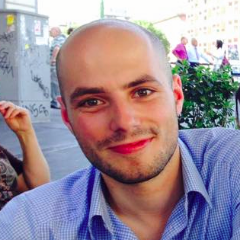True to form, last week's season-opener of Fidelio was as momentous as it was controversial. Surging protestors jostled with riot police in the facing piazza, whilst Daniel Barenboim caused a storm inside, bringing the house down with a 13-minute ovation in his final run of shows as the theatre's music director. The atmosphere in the run up to tonight's performance was altogether more serene, though what took place on stage was electrifying. Warner's modern production feels sharp and relevant, and stagework and music is sublime.
Fidelio is a product of its revolutionary, post-Enlightenment times - a "rescue opera", where the eventual liberation of a main character represents the triumph of the human spirit over tyranny. The main story of the Florestan's incarceration under Don Pizarro and his eventual rescue by Fidelio, who is actually the prisoner's wife Leonore in disguise, is punctuated with a lighter story concerning the luckless love affair between Marzelline and Jaquino. Warner dextrously balances the opera comique-style episodes with the more heroic-tragic elements of the work, carrying off the personal stories vividly against Beethoven's hard-hitting, all-embracing theme of the fight for freedom.
A loose sense of naturalism pervades in the warehouse-cum-squatters' den of Act I. Groups of smokers stand idly amongst the bric-a-brac, and the tracksuited Jaquino and Marzelline produce a melodrama worthy of soap opera screening, here dispatched by Florian Hoffmann and Mojca Erdmann with light, well-produced voices. Jaquino loves Marzellina, but Marzellina has eyes only for Fidelio. Unfazed and coquettish, she plucks and irons laundry, until the knotty relationships reached their fullest expression in the gloriously weaved quartet, for which Barenboim coaxed a tender, twilight introduction of spectacular beauty.
In the darker sweep of the story, Warner treats the idea of captivity with self-conscious nods to contemporary perversions of freedom, with Guantanamo Bay and the Isis kidnappings as two particular reference points. Rocco, the jailer, releases the prisoners for fresh air, and in the ensuing "Prisoners' Chorus" they adopt a posture familiar to us from television images, kneeling with heads drooping and hands tied behind backs. Briefly, the prisoners radiate elation when they are doused in light. But the overriding tone is one of darkness, and their nervous warnings that "Pizarro’s eyes and ears are o’er us!" draw to mind the contemporary mass surveillance systems revealed in the NSA scandal.
Anje Kampe's portrayal of Fidelio's search for Florestan was a splendidly-acted journey of discovery, for which she received a rousing curtain call in spite of signs that she was off full form vocally. Falk Struckmann's Don Pizarro could have had more bite in the baying for blood of "Ha! welch ein Augenblick!", but Warner ensured a terrifying atmosphere when a blithe crowd of followers morphed into a dangerous, barking rabble. The stagework is visually intense – Fidelio should be striking like a work of Chekhov, writes the director in her contribution to the programme notes – and her production works like a film, where dynamic backgrounds of extras provide texture and atmosphere to the main events.
The main events often have Rocco as their centrepiece in this production, who, far from the galoot we sometimes get, is sharp, dutiful, and eager to stay out of trouble. He painfully digs Florestan's grave amongst the rubble and towering columns of Act II, before urgently releasing his chains in a last minute capitulation to justice that was all the more thrilling for having been drawn out. Veteran bass Kwangchul Youn captured the whole gamut of the character with uninhibited acting and a broad nutty voice, from the comical glint in the eye of "Hat man nicht auch Gold beineben" to the more incisive and heroic passages. Rocco showed metal in revealing Don Pizarro's war crimes to Don Fernando, stridently portrayed by Klaus Florian Vogt, before Pizarro met his fate at the hands of a mob with an off-stage gunshot representing a Gaddafi-style lynching.
To end in unalloyed triumphalism could have felt sweetly idealistic and oddly impertinent. Admittedly, the closing passages are ones of jubilation: aid-workers storm in and tear down the back wall to flood the stage with light, yielding fist-pumping, flag-waving crowds in scenes that resemble those for the fall of the Berlin Wall. But Warner conjures sour overtones with the image of a distraught Marzelline, curling centre stage to a beautifully spun love duet from Fidelio and Florestan. The device takes the wind out of the sails, making this feel like just another empty revolution.
“The prisoners have not achieved real emancipation, and neither have we,” seems to be Warner's message. We don't need reminding of the latter point, some might argue, yet Warner's brilliance is in the way she uses imagery specific enough to make Beethoven's theme feel bitingly relevant, whilst maintaining the sort of breadth that steers clear of shoehorning the drama into a mismatched conceptual vessel. This was a rousing end to the Barenboim-Lissner era. Now, as Riccardo Chailly receives the baton in a season studded with some of the less traditional repertoire, La Scala's future continues to tantalise.




